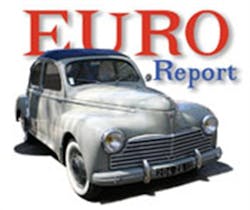"We need to realize that we are not the only country currently regulating tires," said Mike Wischhusen of Michelin North America Inc. at the Clemson University Tire Industry Conference held earlier this year.
A number of those countries are part of the European Union (EU), an economic and political organization designed to set common policies for its 27 members. Asia is also an up-and-comer in the regulations game. Aggressive new policies and testing guidelines are being considered in Indian, Korea and China in addition to established Asian markets like Japan.
Wischhusen, Michelin's director of industry standards and government regulations, talked about regulatory matters in the EU and elsewhere in the world, and how they might affect policy in the United States.
"Regulation is not inherently bad," he said. "In fact, well-crafted regulations offer significant benefits in setting industry-wide and, in the future, hopefully worldwide standards for size and application nomenclature as well as usage guidelines such as load-carrying capacity, speed ratings, fuel economy, etc."
He emphasized how important it is for tire dealers to be aware of foreign regulations.
[PAGEBREAK]
For example, 21 different test methods for endurance and safety are required to approve the same passenger tire design in the following six markets alone: Europe, the U.S., Australia, China, Indonesia and the Gulf countries in the Middle East. In addition, six different tests are needed to measure physical dimensions.
"This situation is very close to strangling us if some level of standardization is not established," he said.
In reaction to this situation, the United Nations Economic Commission for Europe, Inland Transportation Committee and World Forum for Harmonization of Vehicle Regulations (WP29) is developing a Global Technical Regulation (GTR) for Tyres.
EU Directives
There are a number of European tire regulations that will directly affect global tire manufacturing, and may impact the U.S. replacement market in the near future.
If passed, the EU Directive on tire noise, 2001/43/EC, will reduce tire noise by up to four decibels. The resulting tradeoff in performance characteristics could be significant, says Wischhusen.
The EU Directive on aromatic oils, 2005/69/EC, will prevent manufacturers and exporters alike from selling tires containing aromatic oils beginning in 2010. "And if the EU succeeds in positioning itself as the 'world leader' in environmental issues, we could face increasing pressures to adopt similar rules in the U.S."
EU Directive 80/181/EEC Metrication, which was slated to go into effect in 2010, would have forced tire manufacturers to eliminate English measurements such as pounds and inches -- which are required in the U.S. -- from tires sold in Europe. Fortunately, the issue has been tabled in Europe, and is "no longer a possibility."
[PAGEBREAK]
Yet to come?
Various proposals on rolling resistance are already being discussed in the EU, U.S. and Japan, according to Wischhusen.
“Dealing with regulatory issues at a global level and setting international standards to streamline sidewall markings, testing requirements and other key issues is key to creating a system that is manageable for manufacturers and dealers and beneficial for the driving public."
Global tire regulations: Everyone's getting into the act
In addition to the United States, the following countries and regions also have tire regulations on their respective books:
* Canada * Mexico
* European Union * China
* Australia * Brazil
* Venezuela * Argentina
* Persian Gulf Countries
* Saudi Arabia * Jordan
* Nigeria * South Africa.
There are other countries that are in the process of developing and implementing their own tire safety standards independently of each other, according to Mike Wischhusen, director of industry standards and government regulations for Michelin North America Inc. They include India, Malaysia, Korea, Indonesia and Jamaica.




